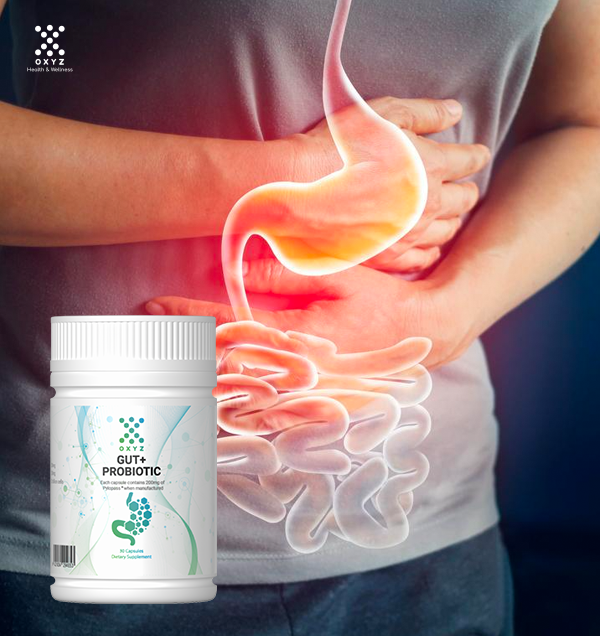H Pylori Symptoms
Abdominal Pain
Indigestion
Heartburn
Stomach Discomfort
Peptic Ulcers
Nausea and Vomiting
Stomach Inflammation (Gastritis)


Peptic Ulcers, Nausea and Vomiting, Abdominal pain, indigestion, heartburn, and stomach discomfort can be caused by H. pylori infection, which, if left untreated, can lead to more severe gastrointestinal issues. However, by implementing the seven methods outlined in this article, you can alleviate these symptoms and work towards prevention. Gut+ Probiotic offers an additional tool to support a balanced gut microbiome, promote proper digestion, and maintain overall gut health, potentially preventing these discomforts. By adopting a proactive approach and making beneficial lifestyle changes, you can find relief and reduce the discomfort associated with these symptoms, leading to a happier and more comfortable life.
It's important to note that some individuals infected with H. pylori may not experience any symptoms, while others may develop more severe conditions such as stomach cancer if the infection remains untreated. If you suspect you have H. pylori or are experiencing any of these symptoms, it's essential to consult a healthcare professional for diagnosis and appropriate treatment.
H. pylori (Helicobacter pylori) is a bacterium that can cause a range of gastrointestinal symptoms and conditions. Here are seven common symptoms and health issues caused by H. pylori infection:
Dietary Adjustments:
Certain foods and beverages can trigger these symptoms, especially if you have an H. pylori infection. Avoid spicy foods, citrus fruits, caffeine, alcohol, and fatty or fried foods. Instead, opt for a diet rich in oatmeal, non-citrus fruits, lean proteins (such as chicken, turkey, and fish), vegetables, and ginger.
Foods to Include in Your Diet
- Oatmeal
- Non-citrus fruits
- Lean proteins
- Vegetables
- Ginger
Smaller, Frequent Meals:
Eating smaller, more frequent meals instead of three large ones can help prevent overeating and reduce pressure on the stomach, potentially relieving these symptoms.Lifestyle Modifications:
Maintain a healthy weight to alleviate pressure on the abdomen, which can exacerbate these symptoms. Also, avoid wearing tight-fitting clothing that compresses the abdomen.Elevate the Head of the Bed:
Elevating the head of your bed by 6-8 inches can help prevent stomach acid from flowing back into the esophagus while you sleep. This is especially beneficial for relieving nighttime symptoms.Probiotics and Gut+ Probiotic:
Probiotics like those found in Gut+ Probiotic can aid in maintaining a balanced gut microbiome, which may help prevent these symptoms. A healthy gut microbiome can improve digestion and reduce the risk of harmful bacteria overgrowth.
Benefits of Gut+ Probiotic:
- Supports a balanced gut microbiome
- Aids in proper digestion
- May reduce the risk of H. pylori infection
- Supports overall gut health
Avoid Late-Night Eating:
Eating close to bedtime can increase the risk of these symptoms. Try to finish eating at least 2-3 hours before going to sleep to allow proper digestion time.Stress Management:
High-stress levels can exacerbate these symptoms. Engaging in relaxation techniques such as deep breathing, yoga, meditation, or mindfulness exercises can reduce stress and minimize symptom severity.
Abdominal Pain:
pylori infection can lead to chronic abdominal pain, particularly in the upper abdomen. This discomfort is often described as a burning or gnawing sensation.
Indigestion (Dyspepsia):
Many individuals with H. pylori experience chronic indigestion, which includes symptoms such as bloating, belching, and an uncomfortable feeling of fullness during or after meals.
Heartburn (Acid Reflux):
pylori can trigger acid reflux symptoms, leading to heartburn and the regurgitation of stomach acid into the esophagus. This can result in a burning sensation in the chest or throat.
Peptic Ulcers:
pylori infection is a leading cause of peptic ulcers. These sores can develop in the stomach lining or the duodenum (the first part of the small intestine) and are associated with symptoms like sharp abdominal pain and dark, tarry stools.
Nausea and Vomiting:
Some individuals infected with H. pylori may experience persistent nausea and may vomit, particularly after meals.
Unexplained Weight Loss:
Unintended weight loss is a concerning symptom associated with H. pylori infection. It can result from a reduction in appetite due to stomach discomfort and indigestion.
Stomach Inflammation (Gastritis):
pylori is a common cause of gastritis, which is the inflammation of the stomach lining. This can lead to various symptoms, including abdominal pain, nausea, and a sense of fullness.

H pylori Symptoms Conclusion
Peptic Ulcers, Nausea and Vomiting, Abdominal pain, indigestion, heartburn, and stomach discomfort can be caused by H. pylori infection, which, if left untreated, can lead to more severe gastrointestinal issues. However, by implementing the seven methods outlined in this article, you can alleviate these symptoms and work towards prevention. Gut+ Probiotic offers an additional tool to support a balanced gut microbiome, promote proper digestion, and maintain overall gut health, potentially preventing these discomforts. By adopting a proactive approach and making beneficial lifestyle changes, you can find relief and reduce the discomfort associated with these symptoms, leading to a happier and more comfortable life.
